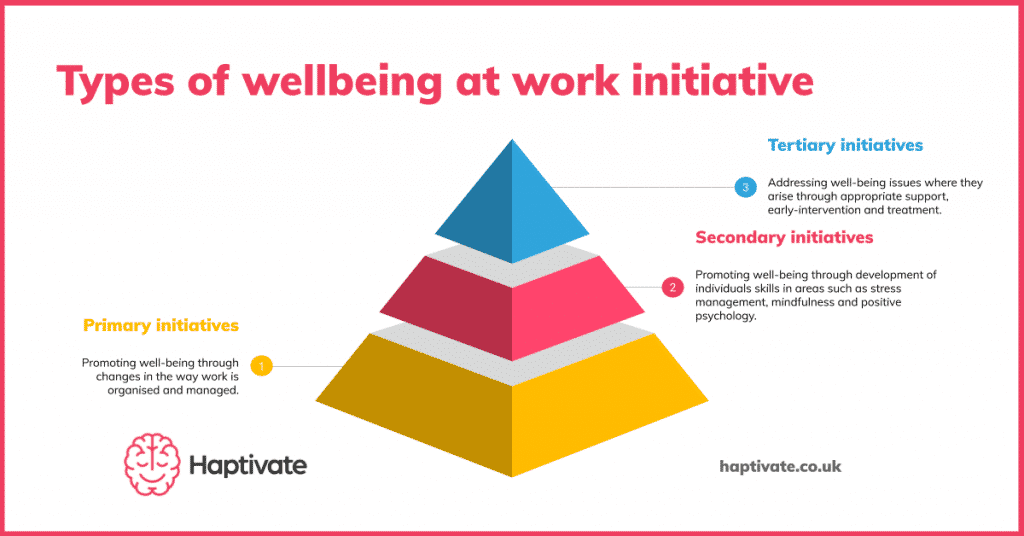Mental Health First Aid (MHFA): How Can It Enhance Wellbeing at Work?

Promoting mental wellbeing at work is no longer a fluffy “nice-to-have”. In an increasingly turbulent world, and with a workforce under increasing pressures, it’s now a necessity.
Among the strategies adopted by numerous organisations, one that stands out is training staff in Mental Health First Aid (MHFA). Known for its practical approach to spotting and addressing mental health struggles, Mental Health First Aid has become a popular choice for many employers.
In this article, we’ll delve deeply into Mental Health First Aid. We’ll explore the role of a Mental Health First Aider, cover what you can expect from Mental Health First Aid Course, examine how Mental Health First Aid integrates into the workplace, and assess how it can contribute to a broader wellbeing at work strategy. Whether you’re a top-level executive or an HR trailblazer, understanding these facets can help shape a more effective, inclusive approach to wellbeing in your organisation.
Table of Contents
Understanding Mental Ill Health: The Visible Battle
You know the saying, “Don’t judge a book by its cover”? Well, that’s especially true when it comes to mental health. On the outside, a colleague might seem perfectly fine. But internally, they could be grappling with stress, anxiety, or other unseen challenges – and masking what they’re going through can add to their difficulties. Every individual’s mental battle is unique, and acknowledging this is crucial.
When people face mental health challenges, it isn’t just about a dip in productivity or a day off work. It’s about the sleepless nights, the struggle to maintain personal relationships, or the courage it takes to face another day. Ensuring our teammates, colleagues, and staff members feel supported and understood is not only a moral imperative but a deeply human one, too.
Beyond the personal realm, there’s a broader business case. Mental ill health can silently erode all-important team dynamics, leading to increased absenteeism, diminished engagement, and high turnover. By taking the initiative, businesses can foster a culture where everyone feels supported. This isn’t just about boosting morale; it’s about building a community where everyone thrives.
So taking a proactive stance on mental health is a must in today’s workplace. Equip your team with the right tools, strategies and support, and you’ll foster a culture of wellbeing. Remember, this approach not only builds individual resilience but also boosts team morale and productivity, establishing a robust foundation for an engaged and thriving workforce.
By actively promoting mental wellbeing, businesses aren’t simply fighting these invisible battles, but catching them early and preventing them from escalating. It’s clear that investing in mental health is a win-win scenario, yielding substantial benefits for both employees and the organisation. The bottom line is that supporting better mental health is better for both your people and your profits.
What is Mental Health First Aid?
Mental Health First Aid, at its core, is a training program designed to teach people how to assist someone who is developing a mental health problem, experiencing a worsening of an existing mental health issue, or is in a mental health crisis. Just like physical first aid is rendered until medical treatment can be obtained, MHFA is given until appropriate support is found or until the crisis is resolved.
The idea behind MHFA was pioneered in 2000 in Australia, by Betty Kitchener, a nurse specialising in health education, and Professor Tony Jorm, a respected mental health literacy professor. Recognising the lack of first aid skills in mental health, the pair developed the training programme which has since spread globally.
In the UK, Mental Health First Aid England took the helm, adapting the Australian model to the UK context. They have been pivotal in championing and rolling out this training, ensuring that workplaces and communities have the skills and knowledge to support individuals facing mental health challenges.
As the conversation around mental health has grown louder and more urgent, MHFA has become a crucial part of the solution, offering both understanding and actionable strategies to address mental health concerns promptly and effectively.

The Role of The Mental Health First Aider
Imagine having someone in your team who can identify the signs and symptoms of mental ill health, has the knowledge and confidence to provide immediate support, and guide those struggling towards the right professional help. That’s precisely the role of a Mental Health First Aider.
Trained in Mental Health First Aid, these individuals are not therapists or health care professionals, but serve as crucial points of contact in the workplace. They create an open door for conversations about mental health and, most importantly, act as a beacon of support for anyone experiencing mental ill health.
Key responsibilities of a Mental Health First Aider include:
- Spotting signs and symptoms: They use their MHFA training to recognise early indications of poor mental health. They’re not there to label or diagnose; rather, they offer an attentive ear and a supportive presence, ensuring those in need are directed to the right kind of help.
- Risk assessment: They conduct mental health risk assessments as per organisational policies and procedures, ensuring the level of support provided minimises potential risk factors.
- Early intervention: Once they’ve spotted signs and symptoms, they step in to provide support. This might involve offering a listening ear, giving reassurances, or suggesting resources or avenues of professional support.
- Crisis response: They use their MHFA training and organisational policies to respond appropriately to a mental health crisis, ensuring safety at all times.
- Maintaining confidentiality: They understand the importance of privacy, keeping all information shared in strict confidence, respecting trust and following organisational policies.
- Documentation: They complete necessary paperwork, such as incident reports and recommendations, maintaining a professional record of their activities.
This is why having a Mental Health First Aider in your organisation isn’t just a title. It’s a crucial part of building a mentally healthy environment at work. It’s about spotting signs of mental illness early on and promoting a culture where talking about mental health isn’t just allowed, it’s actively encouraged and supported.
So, if the question is, “Is MHFA a beneficial addition to my wellbeing strategy?” the answer is a resounding, “Yes!” But how exactly does it fit in and what can it do for you? Let’s keep exploring!
What Does MHFA Training and Certification Involve?
So, you’re thinking of diving into a Mental Health First Aid Course? Good move! While there are many options available, including respected names like St John’s Ambulance (with whom I did my qualification), it’s crucial to ensure your chosen provider is licensed with Mental Health First Aid England. With so many courses popping up online – some legitimate, others not – you’ve got to do your homework.
Though the essentials of each accredited course are standardised by MHFA England, every trainer offers a distinctive spin. They adhere to the same core syllabus, learning activities, and resources, ensuring a uniform standard of knowledge and competence. Yet, each instructor adds a personalised touch, influenced by their own experiences.
The general structure of the MHFA course spans two comprehensive days. It dives deep into understanding various mental health topics, helping to equip learners to recognise the signs of distress and intervene appropriately.
After the training, there’s an evaluation process, in the form of two exams. On successful completion, learners can obtain the Level 3 Award in Mental Health: Workplace First Aider qualification.
It’s recommended that organisations have as many employees trained in Mental Health First Aid as they do in physical first aid. Low-risk workplaces are legally required to have an employee trained in physical first aid for every 50 workers. In high-risk workplaces, the number is one first aider for every 25 workers.
And before we move on it’s worth noting that the MHFA course mainly focuses on reacting to mental health episodes. It might not touch on all aspects of wellbeing at work, which is why it’s only one component of your broader workplace wellbeing strategy.

How is MHFA Used in the Workplace?
Congratulations! You’ve got your certified Mental Health First Aiders. Now what?
Well, here’s how they might step into action within your organisation:
- Observing: They keep an eye out for signs of mental health concerns among colleagues, using their skills to spot subtle changes in behaviour or notable distress.
- Supporting: They act as an initial point of contact, offering non-judgemental support to colleagues who might be struggling.
- Responding: If a crisis arises, Mental Health First Aiders know how to respond. They prioritise safety, de-escalate the situation, and connect the individual with professional support.
- Promoting awareness: They help create an open dialogue about mental health, breaking down stigmas and promoting a supportive work culture.
Just remember, while these roles are vital, they’re just one element of a holistic approach to workplace wellbeing. Mental health first aid excels at addressing issues reactively, but it’s only one piece of the puzzle.
Let’s take a deeper dive into Mental Health First Aid’s strengths as well as its limitations. And then we’ll consider the complementary elements that are necessary for a well-rounded wellbeing strategy.
The Benefits of MHFA Courses: What They Can Do
From the largest corporations to the smallest start-ups, mental health first aid training has proven to be a popular choice in workplaces across the UK. But what makes it such a hot ticket?
Here are the key benefits that Mental Health First Aid brings to the table:
- Early recognition: The training helps to identify early signs of mental ill health, opening doors to prompt intervention and support.
- Crisis management: Armed with skills to handle a mental health crisis, Mental Health First Aiders can assist colleagues experiencing a mental health issue and coordinate professional help.
- Fostering openness: Mental Health First Aid encourages a more open culture around workplace mental health. This breaks down stigma, leading to increased understanding and empathy.
- Commitment to wellbeing: It confirms a proactive approach to employee wellbeing and prepares your organisation for potential future mental health legislation.
It’s clear that Mental Health First Aid offers numerous advantages, providing immediate, on-the-spot assistance to those in need. However, it’s not a one-size-fits-all solution for wellbeing at work.
Limitations of MHFA Courses: What it Doesn’t Do
Although Mental Health First Aid training offers many benefits, it’s important to realise that it’s just one piece of a much larger wellbeing at work picture.
Here are some of the limits that Mental Health First Aid comes up against:
Reactive Focus
MHFA can be likened to a safety net that helps catch those who have fallen into difficult situations due to mental health challenges. But what about the preventive measures that stop employees from falling in the first place?
The MHFA is weighted towards crisis intervention and early detection, but it’s not as effective when it comes to enhancing wellbeing by taking initiative and tackling risk factors head-on. It’s an invaluable tool for when a major issue arrives but may not address the more routine day-to-day aspects of maintaining and improving organisational wellbeing.
One Size May Not Fit All
MHFA training courses follow a prescribed format, which means they offer an overview of mental illness at work. While this broad framework offers a strong foundation, it may not speak to the specific needs of every organisation.
Each workplace comes with its unique challenges and dynamics, whether it’s managing stress levels, cultivating resilience, navigating conflict, or adapting to change. MHFA’s universal approach might not always align perfectly with nuanced needs.
Risk of Overburdening
There’s a potential risk of placing too much weight on the shoulders of Mental Health First Aiders. Without the support of a broader wellbeing strategy, they may become viewed as the organisation’s catch-all solution for wellbeing at work, overwhelming them and exceeding the scope of their skills and capacity. You don’t want to decrease the wellbeing of your First Aider!
Ideally, MHFA should operate within a broader wellbeing ecosystem of HR, line managers and wellbeing champions within the organisation.
Not a Culture Fix
MHFA certainly contributes to creating a supportive environment around mental health. However, it isn’t a magic wand that can solve deep-seated cultural issues or eliminate root causes of work-related stress that are impacting staff wellbeing.
Mental health issues in the workplace can often stem from deeper systemic and structural issues, such as high workload, lack of support, or poor work-life balance. MHFA is not designed to address these underlying issues, and this is where broader wellbeing strategies and complementary initiatives come into play.
Where MHFA Fits into A Holistic Wellbeing at Work Strategy
Understanding where MHFA fits into a comprehensive wellbeing strategy is key to leveraging its full potential and ensuring a robust support system for your employees. A helpful way to visualise this is by considering a primary, secondary, and tertiary pyramid for your initiatives.

Primary Initiatives: Organisational/ Strategic Change
At the foundation of the pyramid, primary initiatives focus on implementing strategic changes at an organisational level. This includes adapting job design, reshaping organisational policies, or refining workflows.
In essence, primary prevention involves proactive measures that enhance overall wellbeing and resilience, thus reducing the likelihood of mental health problems arising.
Secondary Initiatives: Skills/ Culture Change
Nestled in the middle, secondary initiatives emphasise equipping individuals with the skills and knowledge they need to proactively manage their wellbeing.
By fostering a culture change, organisations can facilitate open discussions about mental health, impart training to employees and managers, and offer tools that help identify and address concerns while they’re still in their infancy.
It’s about fostering a preventive approach, arming people with the capability to spot potential issues before they take hold and multiply. Training and initiatives to equip employees and line managers with the skills to proactively monitor, manage and improve their wellbeing levels fit into this category.
Tertiary Initiatives: Reactive Support
Sitting at the top of the pyramid are tertiary initiatives, which are reactive measures employed once a mental health issue has emerged. Mental Health First Aid is a prime example here. When a concern bubbles up, Mental Health First Aiders or Responders step in to offer immediate assistance and direct individuals towards appropriate professional services.
Remember, it’s absolutely critical to have strong tertiary support for employees when a crisis arises. But addressing wellbeing at work requires more than just putting out fires; it’s about preventing them from starting in the first place.
MHFA is a vital part of a holistic wellbeing strategy, but it isn’t a standalone solution to employee wellbeing. Time and resources should be invested in primary and secondary initiatives that address root causes and catch wellbeing issues as early as possible.
You can create a balanced, comprehensive approach that proactively nurtures employee wellbeing, whilst also being ready to respond effectively when problems do arise.
How to Make the Most of MHFA
Embracing Mental Health First Aid training is an excellent step towards acknowledging and addressing workplace mental health. But to maximise its impact, it’s important to use MHFA effectively and in the right context.
Here’s how you can do just that:
Understand its Strengths and Limitations
Clarity on what MHFA can and can’t do is vital. It’s not a silver bullet that can single-handedly solve all of the mental health issues in your organisation! Rather, it’s a tool that forms part of a broader, comprehensive wellbeing strategy.
Remember, MHFA training is geared towards:
- Raising awareness of various mental illnesses
- Providing initial response and support during mental health crises
- Guiding affected individuals towards appropriate professional help
However, it has its limitations:
- It’s a reactive, not a proactive measure
- It doesn’t offer customised solutions tailored to individual organisational challenges
- It shouldn’t be seen as the only mental health initiative within your organisation
Invest in Primary and Secondary Initiatives
While MHFA forms part of your tertiary support, investing time, effort, and resources into primary and secondary mental health initiatives is essential to support its efficacy. This could include manager and employee training on wellbeing strategies, mental health screenings, regular check-ins, and the promotion of a positive work culture. Remember, prevention is better than cure – both for your organisation, as well as those who are a part of it.
Refresh Your Training Regularly
MHFA training is not a one-off event. As with any skills-based training, regular refreshers and updates are needed to keep knowledge current and skills sharp. This is particularly true for mental health, where understanding and best practices are continually evolving.
Make Wellbeing a Whole Organisation Effort
Lastly, it’s important to recognise that wellbeing is a whole-organisation effort. While MHFAs play a critical role, every individual in the organisation has a part to play in creating a supportive and mentally healthy workplace.
From your leadership setting the tone and providing resources, to individual employees looking out for one another, every layer of your organisation contributes to the mental health landscape.
If you keep all this in mind, you can fully leverage the benefits of MHFA as part of a proactive, comprehensive approach to mental wellbeing in your workplace.

Complementing Mental Health First Aid with Other Workplace Wellbeing Strategies
Mental Health First Aid is a fantastically helpful step, but when it comes to workplace wellbeing, it’s not the whole journey. Think of MHFA as one of the many stops on the wellness road map. To reach the final destination – a flourishing workplace culture – we need more tools in our kit.
Cultivating a Culture of Wellbeing
We’re not just talking about policies. It’s about the living, breathing culture that underpins your organisation. A culture where people aren’t afraid to say “I’m not okay”, or to say “No” when they need to. Where leaders support the prioritisation of mental wellbeing. And where work-life harmony is more than a lip-service buzzword.
Regular Wellbeing Workshops or Training – More Than a One-off Event
When it comes to mental wellbeing, knowledge is power. Offering regular workshops or training sessions helps to equip your team with the mental health toolkit they need, and to keep those tools sharp and at hand. Think stress management, resilience building, mindfulness – these sessions can be your team’s guiding light in navigating mental wellbeing.
Importantly, managers play a pivotal role in shaping an employee’s mental wellbeing, similar to the influence of a person’s partner outside of work.
Their reactions, understanding, and approach towards mental health can set the tone for the entire team. Training managers specifically is therefore not just a good-to-have but an absolute necessity.
Take a look at some of our Employee Workshops.
Professional Help – Not an Optional Extra
Even with the most supportive of workplaces, there will be times when employees need the support of professionals. Providing access to Employee Assistance Programs or other external mental health services isn’t just about ticking a box and looking good. It’s about ensuring your team has the support they need when they need it most.
Creating a Tribe of Wellbeing Champions
Alongside your Mental Health First Aiders, why not consider creating a network of wellbeing champions? These are your go-to guys and gals promoting mental health initiatives within the organisation. They’re the in-house change-makers helping to stamp out stigma and get people talking about wellbeing on a daily basis.
Take our look at our wellbeing champion training programme in more detail.
Developing a Tailored Wellbeing Programme
Your workplace is unique, and so are your employees. That’s why an off-the-shelf wellbeing program just won’t cut it. Crafting a tailored programme that addresses the specific needs of your organisation is a game-changer. It signals to your employees that their mental health is not just a passing fad but a genuine top priority.
Get free access to wellbeing resources, news and research
Get access to the exclusive Haptivate Wellbeing Resource Hub and stay up to date with all the latest wellbeing at work research, tools and tips by joining our monthly newsletter. We promise not to share your data or spam you with irrelevant information 🙂
That’s a Wrap!
There’s no doubt that Mental Health First Aid plays a pivotal role in supporting workplace wellbeing. It provides a critical safety net for employees, helping them navigate challenging periods. However, as we’ve delved into in this piece, MHFA is not the be-all and end-all of workplace wellbeing. It’s simply one piece of a broader picture.
Effective workplace wellbeing extends beyond responding to mental health crises. It’s about fostering a culture that values mental health, equipping teams with the right tools, and being proactive in our approach. It’s about catching issues early, addressing them head-on, and building resilience within our teams.
If you’re considering MHFA for your organisation, go for it! But remember, it should just be one facet of a much broader wellbeing strategy. Encourage conversation, promote learning, and above all, demonstrate that mental wellbeing isn’t an afterthought but a core pillar of your organisation’s ethos.

Aysha Frost
Digital Marketing







